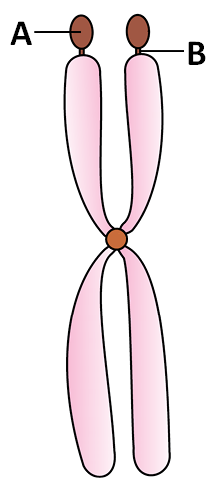Fat soluble pigments like xanthophylls are present in:
1. Chromoplasts
2. Aleuroplasts
3. Elaioplasts
4. Amyloplasts
Proteins that are to be used outside the cell are synthesized:
| 1. | in the mitochondria |
| 2. | on the rough endoplasmic reticulum |
| 3. | on the smooth endoplasmic reticulum |
| 4. | on free ribosomes |
The two types of cellular organelles that transform energy are:
| 1. | Chromoplasts and Leucoplasts |
| 2. | Mitochondria and Chloroplasts |
| 3. | Mitochondria and Endoplasmic reticulum |
| 4. | Chloroplasts and Golgi apparatus |
The arrangement of outer and central microtubules in a cilium is called the:
1. 9 + 1 pattern
2. 9 + 0 pattern
3. Flagellin pattern
4. 9 + 2 pattern
Identify the correct statement regarding the part of a cell, the structure of which is shown in the given diagram:
| 1. | It is not found in the plant cells |
| 2. | It serves to provide an attachment with a surface for a bacterial cell |
| 3. | The structure is made of a protein called flagellin |
| 4. | It can be used for movement by a eukaryotic cell |
What is true regarding the chromosome shown in the diagram given below?

| 1. | It is a metacentric chromosome with A called satellite and B called secondary constriction. |
| 2. | It is a metacentric chromosome with B called satellite and A called secondary constriction. |
| 3. | It is a submetacentric chromosome with A called satellite and B called secondary constriction. |
| 4. | It is a submetacentric chromosome with B called satellite and A called secondary constriction. |
In the given diagram of chloroplast, enzymes required for the synthesis of carbohydrates and proteins are located in:
| 1. | A | 2. | B |
| 3. | C | 4. | D |
In the given diagram, what is true for both A and B?
| 1. | They are involved in protein synthesis |
| 2. | They synthesize steroidal hormones in animal cells |
| 3. | They are a part of endomembranous system of a eukaryotic cell |
| 4. | They are continuous with the inner membrane of the nucleus |
- Which of the following structure is not found in a prokaryotic cell?
1. Nuclear envelope
2. Ribosome
3. Mesosome
4. Plasma membrane
Algae have cell wall made up of
1. cellulose, galactans and mannans
2. hemicellulose, pectins and proteins
3. pectins, cellulose and proteins
4. cellulose, hemicellulose and pectins









